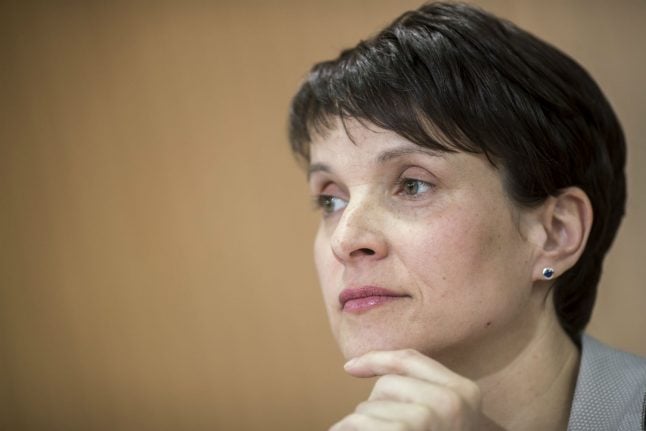“Neither politics nor the AfD are things that I can’t do without,” Petry, who is co-leader of the Alternative for Germany (AfD) told Tagesspiegel on Thursday.
Petry told the paper that it makes sense from time to time to consider “re-calibrating” one’s life.
“That’s the way I see it now after more than four years with the AfD, a time which has demanded an enormous amount of energy and has made me say goodbye to a normal life.”
The AfD was founded as an anti-Euro party in 2013, but lurched to the right two years later, taking a staunchly anti-immigration stance during the refugee crisis of 2015.
Public fear of the adverse effects of the refugee influx, triggered by mass sexual assaults over New Year in Cologne, led to a sharp increase in the AfD’s popularity.
The party gained seats in five state parliaments in 2016, most astonishingly gaining roughly a quarter of the votes in the former eastern state of Saxony-Anhalt.
But the party has also been riven by several internal conflicts, while it has rarely been out of the news due to comments by party leaders seen by many as racist or homophobic.
Most recently Björn Höcke, leader of the party in the state of Thuringia, gave a speech criticizing how Germany remembers the Holocaust, saying that in schools “German history – is made into something rotten and ridiculous.”
The speech led Josef Schuster, chair of the Central Council of Jews in Germany, to respond that “the AfD have shown their true face with these anti-Semitic and extremely inhumane words.”
The controversy led to a feud between Petry and co-leader Jörg Meuthen. While Petry sought to have Höcke expelled from the party, Meuthen has stuck by him.
Plummeting polling figures and a disappointing result in a state election in Saarland this month have also led some analysts to predict the complete demise of the party.
The feuding party leadership has still failed to pick a candidate to lead it into September’s election. Petry has sought to lead the party alone, but other members of the leadership opposed to her want a “team of leaders” for the campaign.
Speaking of internal fights, Petry told Tagesspiegel that one cannot take attacks in politics personally, “otherwise you won’t last long.”
But she conceded that conflicts did have an impact on every politician, admitting that “to say anything else would be a lie.”




 Please whitelist us to continue reading.
Please whitelist us to continue reading.